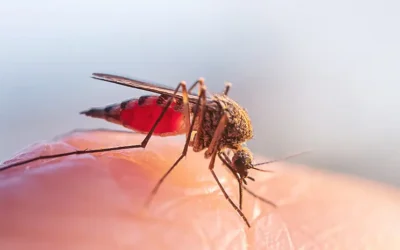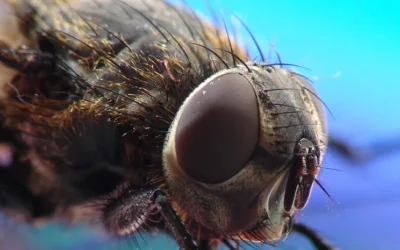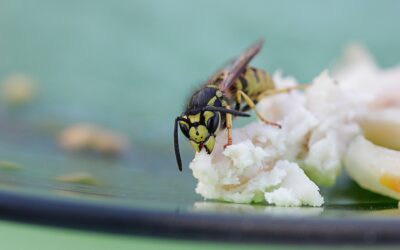Ants are among the most fascinating creatures on Earth. They are masters of organization, cooperation, and adaptation.
They can build vast colonies, communicate through scents, and work together in a way that resembles the functioning of a super-organism.
Ants – extraordinary inhabitants of Earth
Over 12,000 species of ants have been described worldwide, and scientists estimate that many more are yet to be discovered. They live almost everywhere – from tropical forests to deserts and cities. In our part of the world, the most common species include, among others:
- black garden ants – known for building mounds on lawns and in gardens,
- red wood ants – play an important role in forest ecosystems,
- garden ants – often build nests under pavements or terraces,
- pharaoh ants – particularly troublesome in block of flats and buildings.
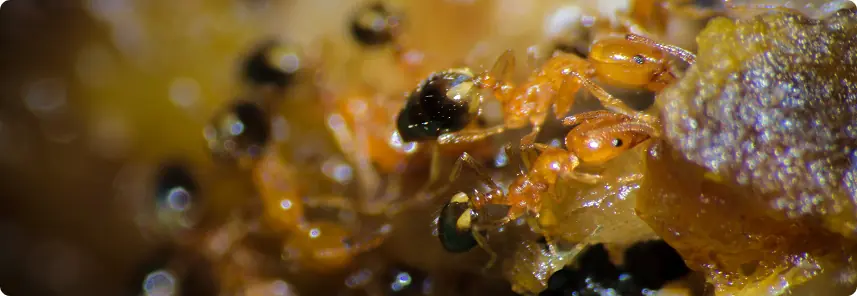
For many years, ants have been a subject of fascination for scientists.
Despite their small size, ants – thanks to their organization and adaptability – can rival the largest animal species in terms of evolutionary success.
Here are some surprising facts:
- It is estimated that there are as many as 20 quadrillion ants in the world – that’s 2.5 million ants for every human!
- The biomass of all ants is, according to some studies, comparable to the biomass of humans, although more recent estimates suggest it is smaller.
- Ant queens can live for several years – except for Pharaoh ant queens, which have a shorter lifespan, usually 1–2 years.
- Ants mainly communicate through pheromones – chemical trails they leave along their paths. That’s why we see entire “highways” of ants marching in the same direction.
- They can carry loads up to several dozen times their own body weight.
- They form “bridges” and “rafts” with their own bodies to overcome obstacles together.
- Some species “farm” aphids like livestock – caring for and protecting them in order to harvest the honeydew as food.
- Pharaoh ants can “split” their colony into smaller groups when they sense danger – making them particularly difficult to control.
Most species of ants that we encounter in gardens or forests are completely harmless to humans. However, alongside the beneficial species that aerate the soil or consume organic waste, there are also those that can become a real nuisance in our homes. The problem arises when their paths intersect with our daily lives – especially in the case of one particularly persistent species with a mysteriously intriguing name: the Pharaoh ant.
Pharaoh ants – small but troublesome tenants
Pharaoh ants (Monomorium pharaonis) are tiny, yellow-brown insects, measuring only about 2 mm in length. Their name refers to legends suggesting they originated from the tombs of Pharaohs – in reality, they come from tropical Africa. Today, they are most commonly found in residential buildings, hospitals, hotels, and restaurants. They thrive in warmth and humidity, which is why they feel so at home in kitchens and bathrooms.
The biggest problem with Pharaoh ants is that they form polygynous colonies – a single nest can house multiple queens. Because of this, when we try to control them using traditional methods (e.g., spraying chemicals), we often achieve the opposite effect: the ants split into smaller colonies and spread even faster. This phenomenon is called budding and makes Pharaoh ants a true challenge to eradicate.
Moreover, they can carry bacteria such as Salmonella and Staphylococcus because they forage in trash bins, drains, and kitchens. Therefore, their presence in homes and medical facilities is not just a nuisance – it also poses a real sanitary risk.
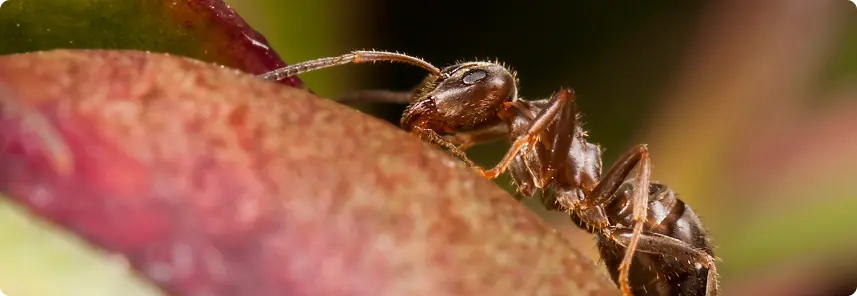
Home Remedies for Ants
You can try to control ants in the garden naturally. The most commonly used home remedies include:
- Sprinkling their paths with cinnamon, turmeric, or baking soda
- Spraying house entry points with vinegar, lemon juice, or essential oils (e.g., peppermint, lavender, clove)
- Securing food and sealing cracks through which they might enter
In the case of Pharaoh ants, such methods are unfortunately only a temporary solution. They may repel the insects for a short time but will not eliminate the colony. Once Pharaoh ants establish themselves in a home, only professional treatments prove to be really effective.
Summary
In the case of Pharaoh ants, such methods are unfortunately only a temporary solution. They may repel the insects for a short time but will not eliminate the colony. Once Pharaoh ants establish themselves in a home, only professional treatments prove to be truly effective.
